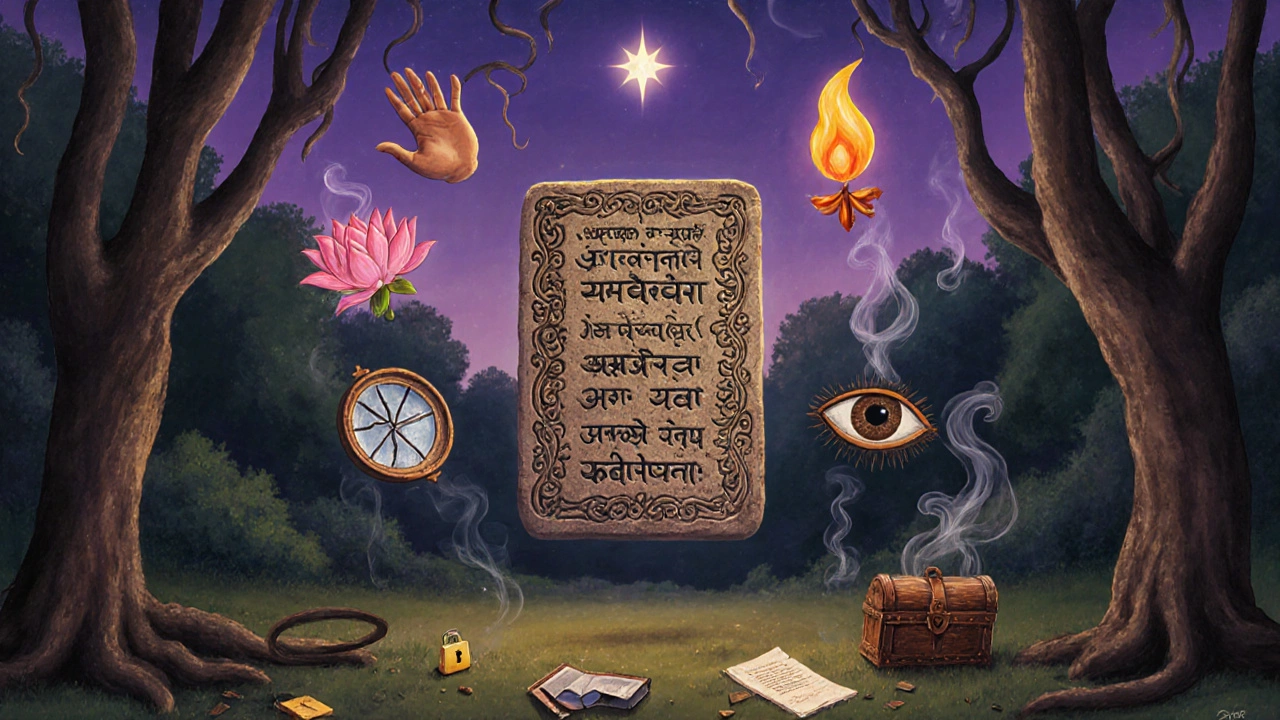The Bhagavad Gita’s 16th chapter is one of the most direct and powerful teachings in the entire text. It doesn’t ask you to meditate for hours or chant mantras all day. Instead, it gives you a mirror - a clear, unflinching look at two ways of living: one that lifts you up, and one that drags you down. This chapter, especially its opening verses, cuts through noise and gets to the heart of what makes a life meaningful.
What Does Chapter 16 of the Bhagavad Gita Say?
Chapter 16 is titled Daivasura Sampad Vibhaga Yoga - the Yoga of the Divine and Demonic Natures. It opens with Krishna telling Arjuna: “There are two kinds of beings in this world - divine and demonic. The divine leads to liberation; the demonic leads to bondage.” From there, he lists out the qualities of each.
What follows isn’t abstract philosophy. It’s a checklist you can use today. Think of it as a spiritual personality test. Not to judge others, but to see yourself clearly.
The Divine Qualities - What Lifts You Up
Krishna lists 26 divine qualities. They’re not about being perfect. They’re about being present. Here are the most important ones:
- Fearlessness - Not the absence of fear, but not letting fear control your choices.
- Purity of heart - Acting from honesty, not hidden agendas.
- Steadfastness in spiritual knowledge - Not chasing quick fixes, but staying grounded in truth.
- Charity - Giving without expecting anything back.
- Self-control - Not suppressing desires, but choosing what serves your higher self.
- Non-violence - In thought, word, and action.
- Truthfulness - Even when it’s uncomfortable.
- Absence of anger - Not ignoring anger, but not letting it rewrite your decisions.
- Renunciation - Letting go of what weighs you down, not just material things, but ego, pride, and need for control.
- Peace - Inner stillness, even when the world is loud.
- Austerity - Simple living with purpose, not punishment.
- Humility - Not putting yourself down, but not putting yourself above others.
- Non-violence - Not just physical, but emotional and mental too.
- Forgiveness - Freeing yourself from the weight of resentment.
- Fortitude - Standing steady when things fall apart.
- Cleanliness - Of body, mind, and environment.
- Freedom from envy - Not comparing your behind-the-scenes to someone else’s highlight reel.
- Freedom from pride - Knowing your worth without needing to prove it.
These aren’t ideals for saints. They’re habits for people who want to live without inner conflict. You don’t need to master them all at once. Just notice one you’ve been avoiding. Maybe it’s forgiveness. Or humility. Or truthfulness when it’s easier to lie.
The Demonic Qualities - What Pulls You Down
Right after listing the divine traits, Krishna flips the coin. He names the demonic qualities - the ones that feel good in the moment but destroy you over time:
- Arrogance - Thinking you’re better than others.
- Conceit - Believing you’re the center of everything.
- Anger - Used as a weapon, not a signal.
- Harshness - Speaking or acting to hurt, not to heal.
- Ignorance - Refusing to see what’s right in front of you.
- False ego - Defining yourself by status, money, or opinions.
- Desire for power - Wanting control over others.
- Grasping - Hoarding, clinging, never feeling enough.
- Envy - Resenting others’ success.
- Intoxication with wealth - Believing money = worth.
- Insulting others - Putting people down to feel bigger.
These aren’t traits of monsters. They’re habits we all slip into. That moment you rolled your eyes at someone’s opinion? That’s arrogance. That time you stayed silent while someone was talked over? That’s cruelty disguised as neutrality. That late-night scroll comparing your life to someone else’s? That’s envy in disguise.

Why This Chapter Matters Today
In a world that rewards noise, speed, and self-promotion, Chapter 16 is a quiet rebellion. It says: “You don’t have to be loud to be powerful. You don’t have to be first to be enough.”
Look at the headlines. Look at social media. Look at your own inner dialogue. How many of the demonic traits are being praised? How many of the divine traits are being ignored?
People praise ambition without ethics. They celebrate success without compassion. They call confidence arrogance when it’s just self-respect. And they call humility weakness when it’s actually strength.
Chapter 16 doesn’t ask you to be better than others. It asks you to be better than your own impulses. It doesn’t say, “Don’t be angry.” It says, “Don’t let anger decide your actions.” It doesn’t say, “Don’t want things.” It says, “Don’t let wanting things own you.”
Real-Life Examples - Where You See This
Think of a manager who yells to get results. That’s demonic energy. They might hit targets, but their team burns out. Now think of a leader who listens, stays calm under pressure, and gives credit where it’s due. That’s divine energy. Their team thrives - not because they’re scared, but because they feel seen.
Think of someone who posts their vacation every day, but never shares how lonely they feel. That’s false ego. Or someone who says they’re “just being honest” when they’re really being cruel. That’s ignorance dressed as truth.
And then there’s the quiet person - the one who shows up, does their work, helps without being asked, and doesn’t need applause. That’s the divine nature in action.

How to Use This in Daily Life
You don’t need to read the entire Gita to live this. Just ask yourself these three questions every day:
- What am I reacting from - fear or love? If you’re snapping at someone, is it because you’re afraid? Or because you care?
- Am I acting to feel powerful, or to be helpful? Are you trying to win an argument? Or to understand?
- What am I clinging to - and is it serving me? Is it your pride? Your need to be right? Your past hurts?
That’s it. No rituals. No special time. Just awareness.
One woman I knew in London, a nurse, started doing this after her father passed. She’d sit for five minutes every morning and ask: “Did I act from fear today? Or from peace?” She didn’t become perfect. But she became more present. More at peace. More herself.
The Bottom Line
The Bhagavad Gita doesn’t promise enlightenment. It promises clarity. Chapter 16 is a map. Not to a distant goal, but to your next step. It says: “You already know the difference between what lifts you and what drags you. You just need to choose.”
You don’t need to be religious. You don’t need to chant Sanskrit. You just need to notice - in your thoughts, your words, your actions - which path you’re walking.
And if you catch yourself slipping into arrogance, envy, or anger? Don’t beat yourself up. Just notice. Then choose again. That’s the whole practice.
The divine nature isn’t something you achieve. It’s something you remember.
What is the exact text of Bhagavad Gita Chapter 16, Verse 1?
The first verse reads: "The Blessed Lord said: Fearlessness, purity of heart, steadfastness in knowledge and yoga, charity, self-control, sacrifice, study of the scriptures, austerity, and simplicity - these are the qualities of one born to the divine nature." This verse sets the tone for the entire chapter, listing the divine traits that lead to freedom.
Is the Bhagavad Gita only for Hindus?
No. While the Gita comes from the Hindu tradition, its teachings on character, choice, and inner peace are universal. People from all backgrounds - Christians, Muslims, atheists, Buddhists - find meaning in its message. It’s not about belief. It’s about behavior. The divine and demonic qualities apply to anyone, anywhere.
Can someone have both divine and demonic qualities?
Absolutely. Everyone has both. The Gita isn’t saying you’re either good or bad. It’s saying your dominant tendency shapes your life. You might be generous at work but jealous in relationships. Or calm in crisis but impatient with family. The point is to notice where your energy is going - and choose to strengthen the divine side, even in small ways.
How is Chapter 16 different from other spiritual texts?
Most spiritual texts talk about how to reach God. The Gita’s 16th chapter asks: How are you living right now? It doesn’t focus on rituals or prayers. It focuses on your daily choices - your tone of voice, your hidden thoughts, your reactions. It’s practical. It’s immediate. And that’s why it still works today.
Do I need to read the whole Gita to understand Chapter 16?
No. Chapter 16 stands on its own. It’s a self-contained guide to human nature. You don’t need to know the story of Arjuna or Krishna to use it. The qualities it describes are recognizable in your own life. Start here. Let it change how you show up - not what you believe.
